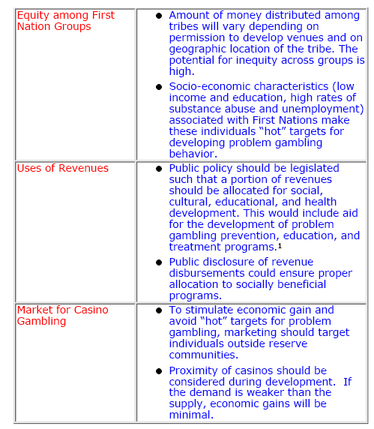The WAGER, Vol 6(35) – Considerations for Casino Development
In 1995 the North American Think Tank on Youth Gambling Issues Final Report cited the "rapid expansion of gambling by lawmakers without analysis of potential effects, positive and negative, on society, and without accepting responsibility for consequences" as one of the negative trends and obstacles associated with gambling related public policy (p. 13) (Shaffer, George, Cummings, 1995). This week’s WAGER will report on a recent attempt to address this important issue in Canada.
Since 1988, there has been growing interest in fostering gambling opportunities on Native American reserves. For example, almost 200 Indian groups have requested casino development in the United States (Spilde, 2001). It is the hope of many Native Americans that gaming venues will result in many economic boons for reserves (National Indian Gaming Association, 2000). Opponents of increasing gaming opportunities, however, fear that expanded gambling opportunities will result in social harm, such as addictive gambling behavior. An important question, then, is how might economic benefits be realized without simultaneously incurring unforeseen social and economic problems? A recently published report by the Canada West Foundation addressed this issue and identified a number of factors to consider prior to establishing reserve casinos in Canada (Kelley, 2001). These factors might apply to US tribes considering building casinos.
This WAGER summarizes some of the factors that the Canada West Foundation thought to be necessary for developing economically beneficial and non-harmful gaming venues. As can be seen in Table 1, the report identified three primary factors of concern: (1) fostering equity among First Nation groups, (2) identifying beneficial revenue uses, and (3) maintaining favorable market conditions. A description of some of the issues pertinent to these factors is also provided in Table 1.
Table 1: Summary of Selected Canada West Foundation
The Canada West report suggests that casinos have the ability to afford many bonuses to communities. Other investigations have reached similar conclusions. Specifically, the National Research Council reported that Native American communities might benefit both socially and economically from casinos (National Research Council, 1999). However, because of measurement challenges and the newness of the field, the actual balance between costs and benefits remains unknown. Accordingly, the Canada West Foundation’s suggestion that potential ills must be recognized and dealt with far in advance is well founded.
One major limitation of this report is that the recommendations were not developed and tested in an empirical study. Doing so may reveal that some suggestions are not effective, are minimally effective, or even will run counter to intended effects. Although research would provide insight into the influence of these recommendations, the absence of this work should not diminish the significance of the report. Little knowledge has been gathered about how casinos affect the everyday lives of First Nations and Native Americans. The Canada West Foundation report represents an important first step toward focusing attention on the array of issues that surround reserve gambling. This is imperative not only so that the lives of historically disadvantaged individuals will be improved, but also because it points public policy makers, scientists and clinicians toward key issues that deserve our attention.
1 As Kelley (2001) notes, in the United States, the Indian Gaming Regulatory Act (IGRA) regulates the spending of revenues for reserve casinos. As reported, the IGRA states that prior to per capita payments to tribal members, spending is restricted to: "(1) Funding tribal government operations or programs, (2) Providing for the general welfare of the Indian tribe and its members, (3) Promoting tribal economic development, (4) Donations to charitable organizations, and (5) Funding operations of local government agencies."
Thus, tribes in the United States have already begun to address this factor.
References
Kelley, R. (2001). First Nations gambling policy in Canada. Gambling in Canada, Research Report No. 12. Calgary, AB: Canada West Foundation.
National Indian Gaming Association (2000). Letter to the Editor of The Boston Globe. Retrieved from http://indiangaming.org/info/bostonglobe.shtml
National Research Council (1999). Pathological Gambling: A Critical Review. Washington, DC: National Academy Press.
Shaffer, H. J., George, E. M., & Cummings, T. (1995). North American Think Tank on Youth Gambling Issues: A Blueprint for Responsible Public Policy in the Management of Compulsive Gambling. Report (02.004). Boston, MA: Harvard Medical School.
Spilde, K (2001). The economic development journey of Indian Nations. Retrieved from http://www.indiangaming.org/library/newsletters/index.html
The WAGER is a public education project of the Division on Addictions at Harvard Medical
School. It is funded, in part, by the National Center for Responsible Gaming, the
Massachusetts Department of Public Health, the Addiction Technology Transfer Center of
New England, the Substance Abuse and Mental Health Services Administration, and the
Center for Substance Abuse Treatment.
